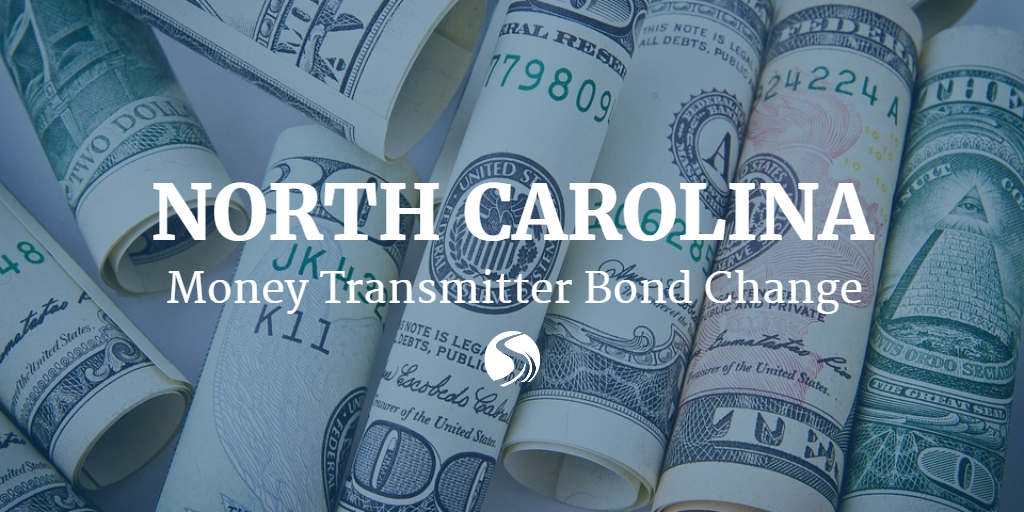Signed into law in June, House Bill 289 went into effect on October 1, 2016 and amends the way that the North Carolina money transmitter bond amount is determined. Previously, the North Carolina Commissioner of Banks set the bond amount at $150,000 plus an additional $5,000 coverage for each additional location. The passage of the new law does away with the bond amount being determined by the number of locations, opting instead to set the bond amount by looking at the money transmitter’s transmission volume within the state of North Carolina during the previous 12 months. The Commissioner determined that a bond amount between $150,000 and $250,000 is adequate to protect money transmitter customers.
The exact bond amounts for North Carolina money transmitters are as follows:
- Transmission volume up to $1,000,000 / bond amount: $150,000
- Transmission volume greater than $1,000,000 but less than $5,000,000 / bond amount: $175,000
- Transmission volume greater than $5,000,000 but less than $10,000,000 / bond amount: $200,000
- Transmission volume greater than $10,000,000 but less than $50,000,000 / bond amount: $225,000
- Transmission volume greater than $50,000,000 / bond amount: $250,000
North Carolina Money Transmitter Bond
North Carolina money transmitter bonds are among the bond category called license and permit bonds, as they are required before a money transmitter may receive their license. Because money transmission businesses help people send and receive money—often electronically—there is an inherent risk when engaging in the business. Therefore the Commission requires licensees to obtain a bond in order to protect people from harm as a result of the money transmitter’s failure to abide by all rules set forth by the North Carolina Money Transmitters Act.
If it is found that the money transmitter has failed to comply with the Act, then all harmed parties may make a claim against the bond up to the full amount of the bond. Although the surety company will initially pay to settle the claim, it then becomes the responsibility of the licensee to reimburse the surety for all money paid out. By having the licensee sign an indemnity agreement—a risk-transferring document—prior to issuing the bond, the surety is guaranteed to receive recompense from the money transmitter for all money paid in the claims process.
House Bill 289 also mandates that any changes in the bond amount must be filed annually by May 31.
Additional Changes for Money Transmitters
As well as requiring the applicant to provide a surety bond, House Bill 289 allows the Commissioner to decide if the applicant must require additional insurance specifically to cover cybersecurity risks as they relate to virtual currency transmission if the bond amount does not cover these risks.
Perhaps the largest change of all is the transition of North Carolina money transmitter licensing to the Nationwide Multistate Licensing System & Registry—also called the NMLS. As it currently stands, the transition period for licensees is between November 15, 2016 and December 31, 2016. For more information on the licensing transition, please see the Money Transmitter FAQ.
